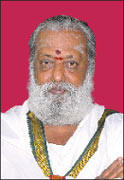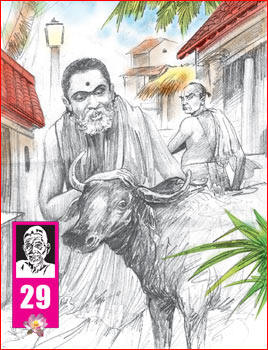சக்தி விகடன் Sakthi Vikaan- 17 May, 2011
Posted Date : 06:00 (17/05/2011)
Ramana Maharishi
 The
two Jñāṉis
(Bhagavan Ramanar and Śeshādri Swāmigaḷ) were in the highest state of
spirituality. They praised each other. Though there were only a few
introductions, they cared for and knew each other well.
The
two Jñāṉis
(Bhagavan Ramanar and Śeshādri Swāmigaḷ) were in the highest state of
spirituality. They praised each other. Though there were only a few
introductions, they cared for and knew each other well.
A devotee told Ramaṇar,
“People say that Śeshādri Swāmigaḷ is insane.”
Ramana Maharishi answered, “In Tiruvannamalai, there are three lunatics:
The first is Lord Aṇṇāmalaiyār; the second is Śeshādri Swāmigaḷ and
pointing to himself, thirdly this lunatic. This news made the rounds in
Tiruvaṇṇāmalai.
Killing a person was euphemism for killing the ego. If someone goes to
the cave, his ego also will be killed.
Śeshādri Swāmigaḷ attained spiritual maturity in Mother Goddess worship
(Sākta)
with wide expertise in Mantras and constant Japams. He attained many
Siddhis as fruits of his practice. He once shouted, “There goes Vittōpā,
there goes Vittōpā,
looking at a Siddhi Mahāṉ flying in the sky. He saw at his location in
Tiruvaṇṇāmalai a Mahāṉ dead in distant Pōḷḷūr.
Periyava had the greatness to divine the thoughts of the people before
him. It was a common
practice for him to laugh and remark on the thought flows of the person
near him. Śeshādri Swāmigaḷ stood before Periyava and stared at his
eyes. A few minutes after
staring at his eyes, he could not apprehend who SriRamaṇa Maharishi was
(could not read his thoughts). He asked Bhagavan, “You are unable to
read the thoughts.” Bhagavan did not reply and kept quiet. That silence,
Śeshādri Swāmigaḷ could not stand.
Śeshādri Swāmigaḷ said loudly, “Worship of Aruṇāchalēśvarar will yield
liberation or Mukti to the worshiper.” Bhagavan in a soft voice said,
“Who worships whom?” Śeshādri Swāmigaḷ laughed louder and said, “This is
beyond my comprehension.” The two Jñānis took up this wonderful subject
and shared their thoughts.
Śeshādri Swāmigaḷ is at the pinnacle of Bhakti. Mantra Japam was the
instrument of his Bhakti-worship. Body piercing, pulling the temple car,
attending festivals, temple worship, performing ablution and worship,
worship of idol in the house three times a day, chanting Slokas, Thēvara-Thiruvāsaka
reading, performing fire sacrifice and Yagnas…: These are the exoteric
forms of worship of Bhakti Path. These paths bring changes. Such person
knows the ins and the outs of the Bhakti path. He knows the past, the
present and the future. He can see God. He can acquire godhood.
But, Srīramaṇar took a different path. There
was an internal change with the snap of fingers.
There came an epiphany: That is This; This is all-pervasive. It
became absolutely clear to him, ‘This One is all-pervasive, intrinsic,
plenitudinous, perfect, and irremovable inner abider.”
The thought that all these are mere staged acts in plays is firmly
established: Eating, dressing, sleeping, talking, laughing… He realized,
one day the drama comes to an end; there will be singing of ‘Long Live.’
What is seen is a mere dream: that thought brought peace to him.
Not all acquire this view of life; it is a continuation of past life. It
is a life of the purest of pure Satyam. It is a divine form worthy of
worship by supreme Bhaktas and Bhāgavatas.
It is not a matter of seeking God; it is not the ecstasy of
finding God; That wonderful form morphed from man to God.
Of these two paths, which path should we choose?
You don’t have the power to choose. Fate is stronger and
therefore the chooser. We should go in the direction the ordained fate
pulls you. On the trodden path, it is a great fortune to lead a life
designed for you by God or continue seeking God. That fortune is easily
acquired when we meet with Mahāns of this nature.
These virtuous people are easy of approach. Both are same by appearance.
Bhagavan sits with a loincloth. Śeshādri wanders with unoiled head,
dirty shawl, a long loincloth (Dhoti)…
Śeshādri Swāmigaḷ used harsh biting words, ridiculed, chased people
around him. Those who are strong and survive these onslaughts and bum’s
rush and those who are hungry for spiritual knowledge, become thick
disciples.
Bhagavan is silent but subjects others to tests. Knowing his silence and
communicating with him through silence, the successful become his
disciples.
They who go to Bhagavan asking for material things and positions of
power, are not his favorite
visitors. Ordinary people need wealth, what to do?
The shopkeeper’s fate changes, when a miscreant grabs a bunch of coins
from the sales register and throws them on the street. When the
miscreant is stopped and chased, there is loss. He wins who understands
that the episode was an unwelcome deed inflicted on him from past life
Karma. The chaser sustained a loss.
Śeshādri Swāmigaḷ stood in the middle of the street in Tiruvannamalai
under the hot sun and looked at a buffalo, losing his self-awareness. A
Brahmin passing by said, “What are you looking at?”
Swāmigaḷ: “What is that?”
Brahmin: “Buffalo.”
Swāmigaḷ: “Is that Buffalo? You are the buffalo. That is Parabrahmam,
Parabrahmam.”
He goes to the buffalo and gives it a rub and then an embrace. The
Brahmin leaves with a shut mouth and thinks Swāmigaḷ was a lunatic. But
what he said to the Brahmin is Truth in effulgence. Outwardly, he is a
madman.
“Śeshādri, come here.”
“What, mother?” He asks his mother with love. His mother is on the
deathbed.
“Tiruvannamalai, Tiruvannamalai, Tiruvannamalai: Think of it and attain
liberation.” That is his mother talking in a soft voice with tears
running down her face. That was her last speech. Thinking of
Tiruvannamalai, she attains liberation.
She transferred that spiritual thought to her son.
That Great Saying left an indelible mark on his heart, mind and soul. It
stayed there permanently. (His mother’s advice was etched in his DNA.)
He who rejected marriage and family, now abandons his own place of birth
and goes to Tiruvannamalai.
He learnt Bālātripurasundari
Mantra in Kanchi, chanted it in Kanchi Amman Temple, banks of the river,
grasslands, funerary… and a sense of lunacy appeared inside.
His family was advised marriage was the cure for his lunacy. Śeshādri
rejected it.
The relatives scolded him for entering the house without a bath after
visiting the funerary.
He gave up residence in his house saying, “Ok, No more stay in this
house.” No one could stop him. He wandered back and forth in
Tiruvannamalai as a beggar.
He rose seething with anger when he heard, “In Pātāla
Liṅgeśvarar
sanctum, a child was sitting without awareness. The urchins are throwing
stones on him.”
“Dey” (Hey). The temple trembles. He picks up the child like a ball of
flowers. The body was
oozing blood and pus with ants, insects…crawling all over him. That
child was unaware of all these miseries.
He was deep in meditation.
Śeshādri Swāmigaḷ knows what it is.
He cleaned him up and relocated him. The child continues
meditating. That child is the future SriRamaṇa Maharishi.
Swāmigaḷ never once told Bhagavan Ramana Maharishi, “That day I saved
you. I helped you.”
He threatens saying, “Hey, the person in the Mudaliar mountain receives
a salary of 10,000 rupees. My salary is 1000 rupees. Should you not earn
100 rupees?”
This is not money. This is not salary. This is love for Bhagavan
SriRamaṇa Maharishi, who was weighed. It is the conviction that
Bhagavan’s spiritual worth is ten times more. Should he not earn 100
rupees? Pointing to Mahan
to those who sought or took refuge in him and putting them in the right
path.


